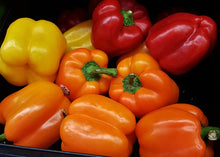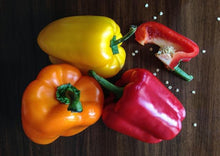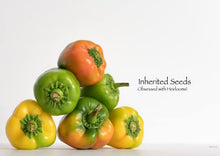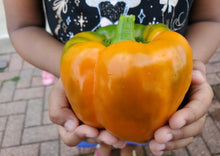
Heirloom Horizon Orange bell pepper is a rare and highly sought-after variety of pepper that has a rich history and deep roots in the gardening world. This heirloom pepper is known for its bright orange color, sweet flavor, and large, thick-walled fruits. It's a popular choice for home gardens and small farms.
The Horizon Orange bell pepper is an heirloom variety that has been passed down through generations. The origins of this variety is uncertain, but it is believed to have been introduced to the gardening world in the late 20th century. It quickly gained popularity among home gardeners and small farmers for its sweet flavor and bright orange color.
Heirloom Horizon Orange bell pepper is an open-pollinated variety, which means it is passed down through generations preserving the genetic diversity of the plant. Heirloom varieties are known for their unique characteristics, rich flavor, and the ability to adapt to different growing conditions. This pepper is a great option for home gardeners who want to grow a variety of pepper that is easy to grow, reliable, and produces high yields.
This pepper is also known for its versatility in the kitchen. It can be eaten raw, cooked, or pickled, and is a popular ingredient in a wide variety of dishes, from salads and sandwiches to stir-fries and stews. It's also a great source of vitamins and minerals, including vitamin C, vitamin A, and potassium.
In conclusion, Heirloom Horizon Orange bell pepper is a rare and highly sought-after variety of pepper that has a rich history and deep roots in the gardening world. This heirloom pepper is known for its bright orange color, sweet flavor, and large, thick-walled fruits. It's a popular choice for home gardens and small farms, and is a versatile ingredient in the kitchen. As the demand for heirloom varieties continues to grow, the Horizon Orange bell pepper is likely to become an even more popular choice among gardeners and chefs.
Planting
- Recommended to start seeds indoors rather than in the garden.
- The soil temperature must be at least 70°F for seed germination, so keep them in a warm area for the best results. Use a heat pad under the seed tray, if necessary.
- Plant seeds about 1/4 inch deep.
- Start seeds indoors 8-10 weeks before your last spring frost date.
- Bell peppers require a fairly long growing season (60 to 90 days), so it’s best to get them started indoors.
- Bell Pepper plants require full sun to produce the largest and healthiest fruit, so pick a site that won’t get shaded out by trees or other garden plants.
- Soil should be well-draining and rich in organic matter.
- A soil consistency somewhere between sandy and loamy will ensure that the soil drains well and warms quickly.
- Soil pH should be slightly on the acidic side, 5.5 to 6.5 ideally.
- A week before transplanting peppers into the garden, introduce fertilizer or aged compost into your garden soil.
- Avoid planting peppers in places where you’ve recently grown other members of the nightshade family such as tomatoes, potatoes, or eggplants as this can expose peppers to disease.
Transplanting
- Begin to harden off plants about 10 days before transplanting outdoors.
- Once nighttime temperatures reach at least 60°F, transplant seedlings outdoors, space them 18” to 24” apart.
- Plant the transplants no deeper than they were already; otherwise, the stems may become susceptible to rot.
- Soil temperature should be at least 65°F, as peppers will not survive transplanting at temps any colder. Northern gardeners can warm up the soil by covering it with black plastic.
Care
- Soil should be well drained, but be sure to maintain adequate moisture either with mulch or plastic covering.
- Water one to two inches per week, but remember that peppers are extremely heat sensitive. If you live in a warm or desert climate, watering everyday may be necessary.
- Fertilize after the first fruit set. Peppers love fish emulsion, consider feeding once every two weeks.
- Weed carefully around plants to avoid disturbing roots.
- If necessary, support plants with cages or stakes to prevent bending. Try commercially available cone-shaped wire tomato cages.










